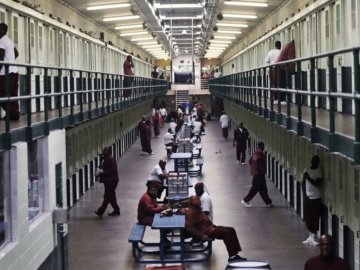Agency and the Criminal Justice System: Agency for Me, but Not for Thee

An agent is the locus of decision-making. If determinism is true, and there is no free will, then no person is “deciding” anything. Agency would be an illusion. Some people, in an effort to be kind, forgiving, and understanding will point to environmental conditions or brain science to explain or excuse poor behavior. Sam Harris and the comedian Whitney Cummings do this, according to their own testimony. Cummings, if she encounters someone behaving badly and engaging in road rage, for instance, will tell herself a little story having to do with brain science. “Oh, their amygdala is being hyperactivated and certain hormones are flooding the person’s bloodstream.” So, she “forgives” the person, or at least adopts a pseudo-understanding attitude to the person by completely dehumanizing them. The moral implications are diabolical. The strongest prohibitions against harm that exist are those against people. This is why many science-inspired perspectives of people are problematic. There simply is no humanity, and certainly no ascription of humanity, without agency. If someone does not believe in agency, then he does not believe in people. Sam Harris and countless others will continually alternate between calling human beings “apes” or “machines.” Harris tends toward the machine metaphor. Machines are rule-following devices and are deterministic. This attitude, which applies to himself also, leads Harris to the most ridiculous contradictions, where he “chooses” which perspective he will adopt, agential or non-agential, depending on context, in violation of his own philosophy.
It is usually not helpful nor enlightening to describe people as apes. If there really is no difference between people and apes, on what basis could anyone object to marrying one? Some scientists point out that it is very superficial of us to think of primates as the closest living creature to us. This tendency is motivated by the fact that of all other animals, they look the most like us. In fact, it is dogs who are the closest non-human animal to human beings in the ways that matter most. They have evolved to understand human facial expressions and feelings and examine our faces for emotional information in exactly the same way that humans do. Dogs are also the only other creature that understand pointing. No primate can. To do that, dogs need an excellent “theory of mind;” meaning an intuitive understanding of human intention, among other things; a feeling for the human interior. If someone hides something from a dog, and the dog knows this, it will examine a person’s eyes to see if he gives away the hiding place by glancing at it. That demonstrates tremendous subtlety and intuitive “feel” for what might be going on internally for us. Scientists tend to forget about dogs precisely because they are so ordinary to us.
Courts of law and the legal system in general only make sense on the premise that free will and agency exist. Courts of law, in criminal cases, must decide questions of fact, who did what to whom, for instance, but also try to determine intent. Someone who kills someone else accidentally is regarded as much less culpable than a cold-blooded murderer. In fact, murder as a crime includes intent in its definition. Commentators have observed that there is always a tension between courtroom proceedings and the testimony of psychiatrists and psychologists. These last two “expert” witnesses are almost always appealing to causes and not reasons.[1] Physical events have causes; only people have reasons. Psychologists implicitly regard people as objects to be explained. The theory of behaviorism was the most extreme effort by psychologists to dehumanize people by completely eliminating notions of mind. They attempted to find laws of machine-like input and output, stimulus and response, which was a miserable failure, because, of course, the response will change depending on what is going on in someone’s mind.

In the 1960s, there was a strong movement among judges and social commentators to explain and excuse violent criminal behavior. A theory developed among some that living in relatively impoverished conditions was “violence” being visited upon people. This metaphorical use of the word was then used to say that if poor people were literally actually violent then this was a perfectly reasonable and even excusable reaction to the metaphorical “violence” that they had been experiencing. The syllogism might look something like this: I don’t like my apartment or general surrounds. Therefore, I will violently assault, rape, or even kill someone who has nothing to do with my living conditions. In fact, I am most likely to assault someone who shares my living conditions. When violence and anti-social behavior is excused as an understandable reaction to life circumstances – in other words – when it becomes socially acceptable – then this behavior is encouraged. And in fact, there was a proliferation of violence in the 1960s culminating with the peak homicide rate in the early 1990s. It is hard to prove cause and effect in social science, but this seems likely. A comparison could be made with the notion of “free love.” When this idea became fashionable and socially acceptable large numbers of people did in fact start behaving in a promiscuous fashion, and no one disputes this instance.
There is a correlation between violent crime and poverty, though not between white collar crime and poverty, obviously. It can be observed that the sorts of qualities a person has that might be expected to lead to poor job prospects are likely be correlated with criminal behavior; things related to discipline, capacity for hard work, impulse control, a desire for easy money, and attitude towards education are likely to be connected. However, suggesting that all poor people are inherently criminal in outlook and behavior is a slander on poor people. The honest poor is a perfectly real and respectable category of people. And then there is the fact that some poor people are criminals who take a predatory attitude toward their neighbors, and some poor people are the entirely innocent victims of these predators. In fact, by far the most troubling victims of violent criminals are the honest, law-abiding poor who share their neighborhoods. It is particularly galling for those living in gang-infested areas that the social commentators who want to excuse criminal behavior, as not being the criminals’ fault, are usually safely out of harm’s way, some even living in gated communities, and do not have to live with the consequences of their arguments and policies. If the legal system as a whole adopts a lenient and “understanding” attitude to crimes against people and property, denying agency to bad actors, and if behaving badly is excused and even supported as part of the general cultural environment, then it seems hard to see how these things would not contribute to these pathological trends.

Sociology aspires to be a science. As such it will focus on causes, not reasons. Reasons are mind-dependent and related to agents. Causes are mindless physical processes that have nothing to do with agents. So, science tends towards dehumanization. It is necessary to step outside science and adopt a fully human perspective which uses scientific information if and when it seems useful. The upside of the scientific approach to the cynical is that it no longer renders agents responsible for their actions – it is a get-out-of-jail-free card. The downside is that it removes any possibility of changing one’s life for the better. Describing criminal behavior as the inevitable response to environmental conditions is dehumanizing and even anti-human. The criminal justice system cannot work or be remotely meaningful without attributing agency to people. It is necessary to remember that science is not proving that we have no agency. It is simply incapable of recognizing agency and so ignores it. Some anti-agency determinists like Sam Harris and Daniel Dennett admit that they do not officially believe in individual responsibility but suggest that we need the threat of criminal prosecution and prisons as a deterrent to bad behavior. Criminal responsibility does not exist, they think, but we should pretend it does because it has beneficial effects. This attitude is grossly immoral, since the inability to do otherwise is always a defense and thus to prosecute such people would be to persecute the innocent. Guilt only exists if agency exists. So, Harris is proposing that we scapegoat innocent people for reasons of expediency. Most damning of all, he assumes that we have a free choice about whether we will have prisons or not, whether we will prosecute people or not, when determinism says it is not up to Harris or anyone else to decide such things. There are no “decisions” per se without agency. If Harris is right, then everything is simply a “sequence of events” and human beings are functionally indistinguishable from their surrounding environments. What we do is the result of physical causes like other physical phenomena. The concept of “deterrence” is completely illegitimate from this point of view since it implies the existence of minds and reasons. So, unfortunately, for Harris, references to deterrence make no sense under his view. But the real nail in the coffin for Harris’ view is that we need not worry ourselves with the morality or immorality, the usefulness or non-usefulness of prisons and prosecution, since choice does not exist and whatever will be will be. Not only does fatalism absolve the criminal, it lets the intellectual off the hook also.
Notes
[1] Nassim Nicholas Taleb excludes psychology as an area of expertise in the same way that there are no expert astrologists, or predictors of the future.




